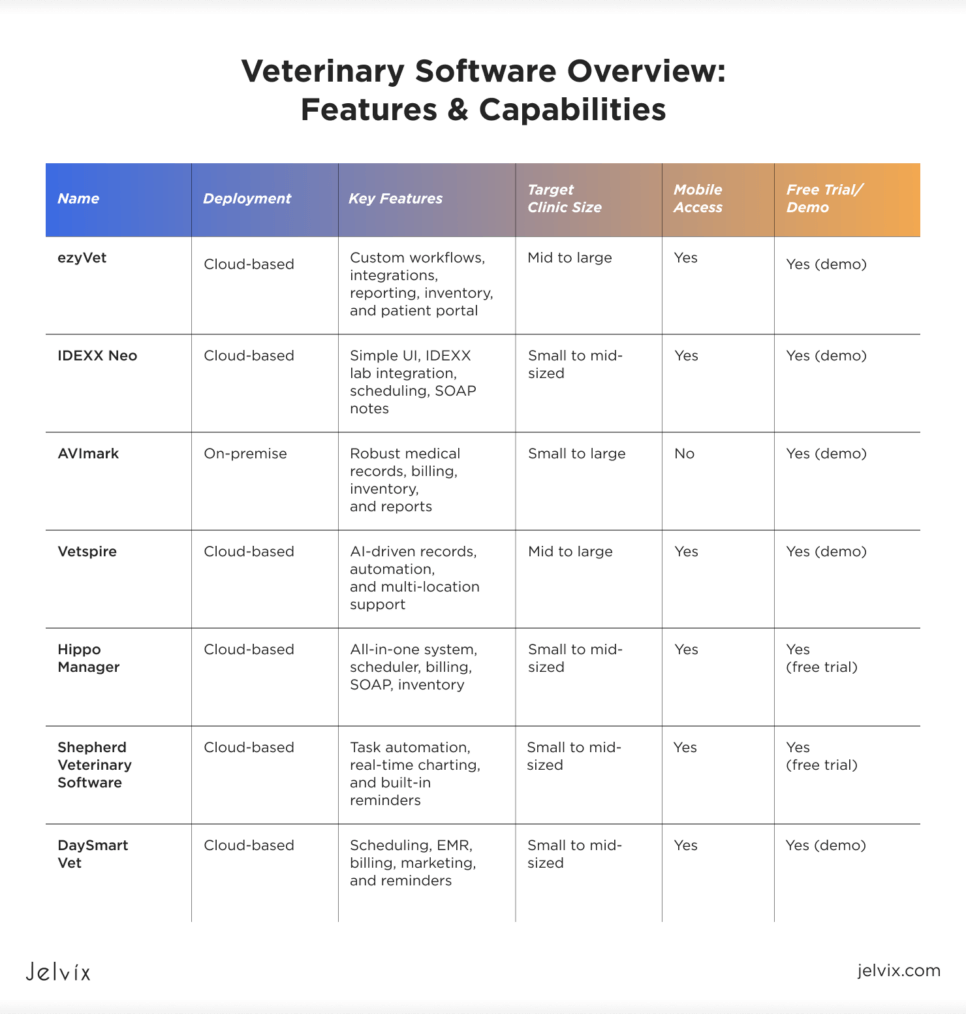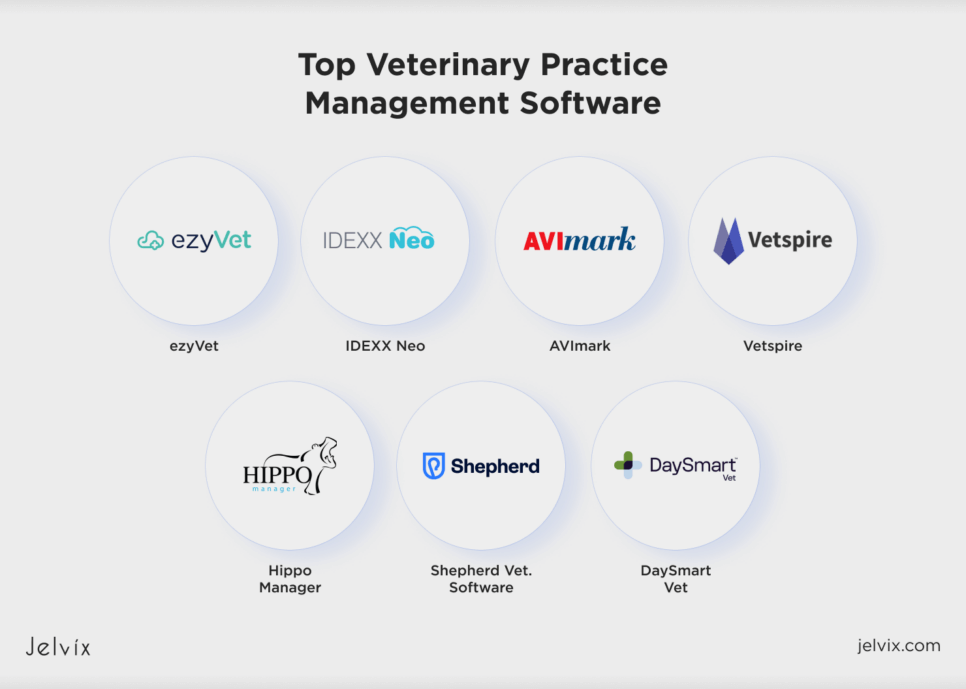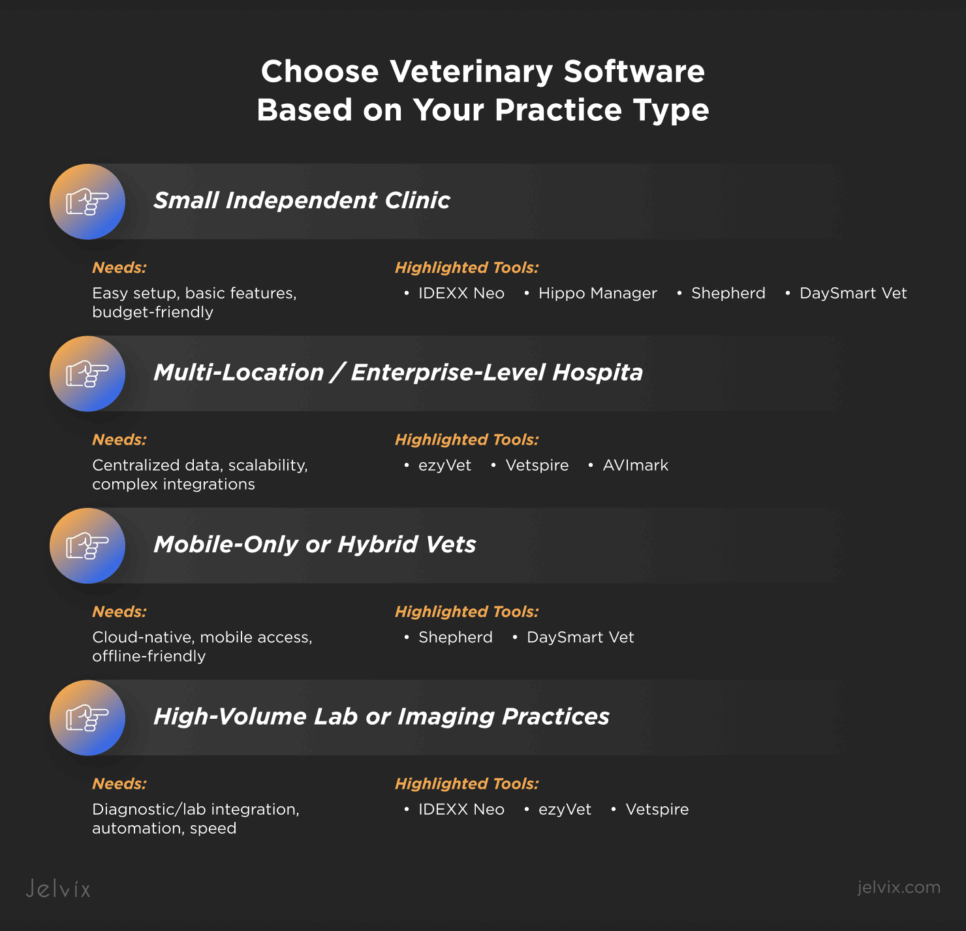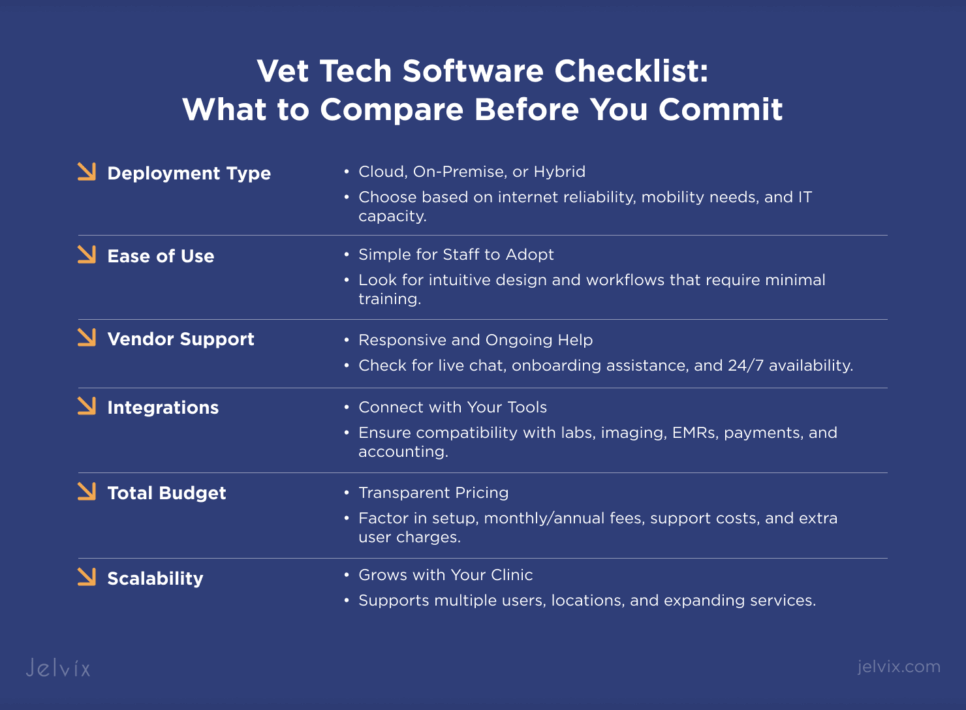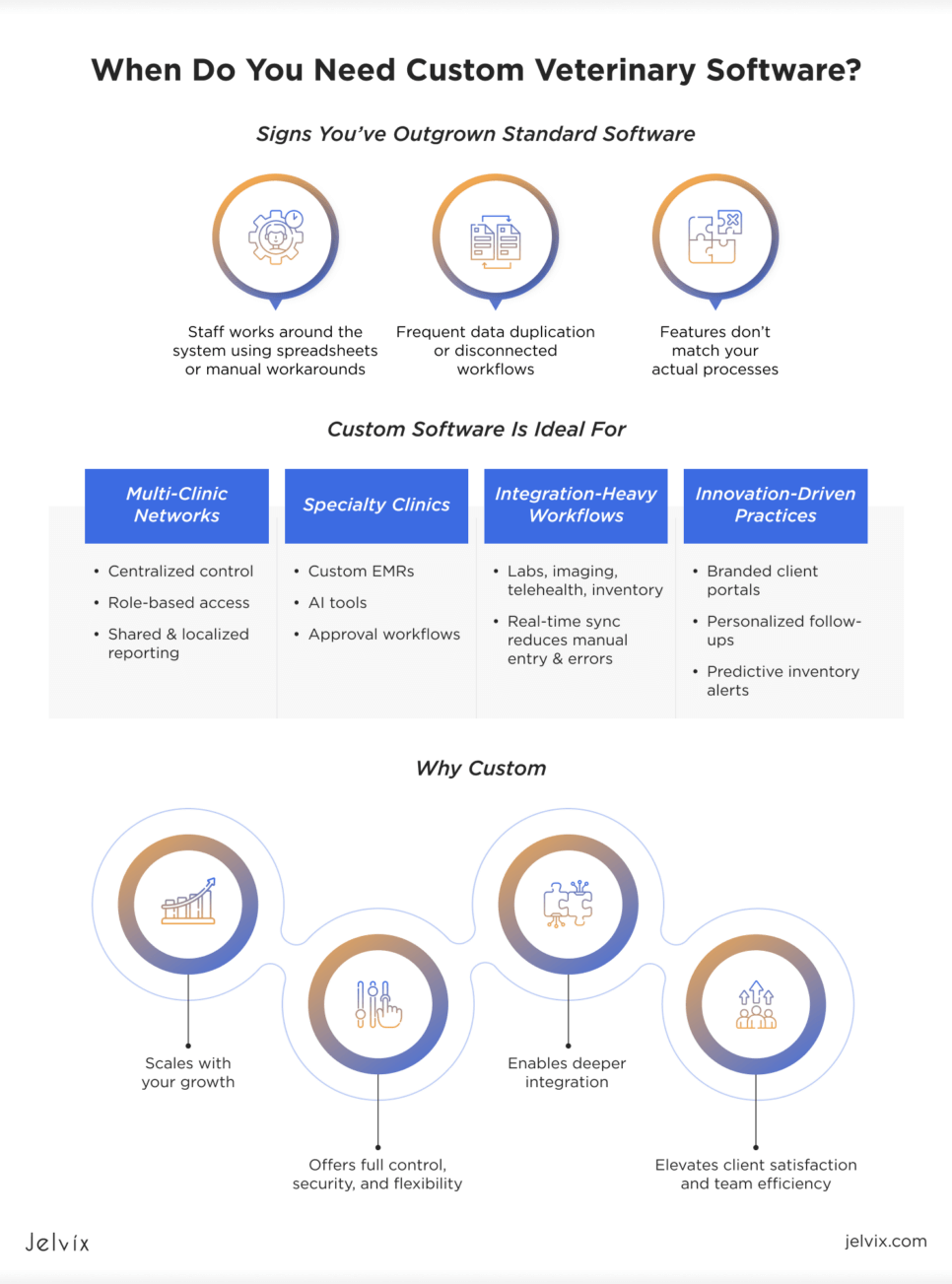The U.S. veterinary industry is now worth USD 65.6 billion, driven by rising pet ownership and demand for specialized care like surgery and oncology. Veterinary practices need to handle more medical records, billing, and communication, and many start investing in veterinary scheduling software.
However, matching VPMS to your clinic’s size and goals without overspending is a significant challenge. From pricing and features to integrations and support, the market is crowded, and it’s not always clear which apps for veterinarians will fit your workflows.
If you want to choose a user-friendly software for veterinary clinics that can fulfill your practice’s needs, read this guide. You’ll find out how to compare veterinary software platforms, why assessing them based on your real needs is critical, and what top tools for multi-location animal hospitals, solo practices, and specialty clinics are worth investing in.
Veterinary Software Comparisons: Tools To Consider in 2025
The veterinary software market is expected to surpass USD 674 million by 2031, driven by growing demand for automation, telehealth, remote access, and EMR software development and integration.
To help you choose the right VPMS for your clinic, our experts have compared seven popular platforms based on deployment type, key features, and pricing. This snapshot will give you a quick, side-by-side view of how each solution fits different clinic sizes, workflows, and budgets.
All veterinary software companies listed above offer a unique balance of features, pricing, and scalability. While cloud-based systems now dominate the market, options like AVImark still appeal to clinics with legacy infrastructure.
Top Veterinary Practice Management Software Tools: Detailed Reviews
Choosing the right animal hospital software should depend on your clinic’s size, workflows, and long-term goals. Below, you can find veterinary software reviews of seven leading options so that you can understand which medical software development services you need and make a confident decision.
ezyVet
ezyVet is a cloud-based VPMS built for clinics that need deep customization, strong integrations, and flexible workflows. It’s used globally by mid- to large-sized practices.
Key Features
- Customizable workflows and permissions;
- Built-in integrations with labs, imaging, and accounting tools;
- Inventory management with supplier links;
- Advanced reporting and analytics dashboards;
- Client communication tools, including portals and reminders.
Pros
- Highly customizable and scalable;
- Extensive third-party integrations;
- Strong reporting and automation features.
Cons
- May be overwhelming for small teams;
- Requires a learning curve during setup.
Best Fit
Mid-sized to large clinics, specialty hospitals, and multi-location practices with complex workflows.
Pricing
Custom pricing per clinic based on setup and size.
IDEXX Neo
IDEXX Neo is a lightweight cloud-based VPMS designed for smaller practices, especially those already using IDEXX diagnostic tools. It prioritizes simplicity, speed, and accessibility.
Key Features
- Simple user interface for quick learning;
- Seamless IDEXX lab and imaging integration;
- SOAP-based medical records and client notes;
- Appointment scheduling and reminders;
- Access from any device with internet access.
Pros
- Very easy to set up and use;
- Strong IDEXX ecosystem integration;
- Affordable for smaller teams.
Cons
- Limited flexibility and customization;
- May not meet the needs of large or complex clinics.
Best Fit
Small to mid-sized clinics that value ease of use and already rely on IDEXX for lab diagnostics.
Pricing
Monthly subscription based on users and features.
AVImark
AVImark is a long-standing, on-premise veterinary software widely used by North American clinics. Known for its stability and deep functionality, it supports a wide range of administrative and clinical tasks.
Key Features
- Centralized patient records with SOAP templates;
- Integrated billing, inventory, and reporting tools;
- Treatment plans and customizable reminders;
- Prescription labeling and refill tracking;
- Works offline with local data storage.
Pros
- Reliable and time-tested system;
- Robust features for day-to-day operations;
- One-time license model (no monthly fees).
Cons
- Dated user interface compared to modern tools;
- Lacks native cloud or mobile access;
- Requires local server setup and IT support.
Best Fit
Established small to large clinics with existing on-premise infrastructure and minimal need for remote access.
Pricing
One-time license fee, varies by configuration.
Vetspire
Vetspire is a modern, cloud-based VPMS that combines veterinary workflows with AI-powered features. It’s designed for multi-location clinics and practices seeking automation and scalability.
Key Features
- AI-assisted medical recordkeeping;
- Automated charge capture and inventory tracking;
- Multi-location and specialty support;
- Integrated client communication and payment tools;
- Real-time analytics and reporting dashboards.
Pros
- Innovative use of veterinary AI to save time on records and billing;
- Scales well for enterprise and multi-location practices;
- Clean, modern interface with strong UX.
Cons
- Custom pricing may not suit smaller clinics;
- Vet AI features may require staff adjustment or training.
Best Fit
Large clinics, enterprise veterinary groups, and specialty hospitals looking for automation and advanced analytics.
Pricing
Custom pricing per clinic, depending on features and size.
Hippo Manager
Hippo Manager is a cloud-based vet software for small and mobile practices designed to offer all essential features at an affordable price. It focuses on simplicity, speed, and complete practice access from anywhere.
Key Features
- Appointment scheduling and digital whiteboard;
- SOAP medical records and invoicing;
- Inventory and purchase order management;
- Built-in telemedicine tools;
- Unlimited data storage and users.
Pros
- Budget-friendly with a flat monthly rate;
- Easy for staff to learn and use;
- Cloud access with mobile compatibility.
Cons
- Fewer advanced customization options;
- Reporting tools are more basic than some competitors.
Best Fit
Small to mid-sized clinics looking for affordable, straightforward software with core functionality.
Pricing
Flat monthly rate per clinic with unlimited users.
Shepherd Veterinary Software
Shepherd is a cloud-based veterinary software focused on reducing administrative overhead through automation. It emphasizes real-time charting and guided workflows to minimize missed charges.
Key Features
- Real-time SOAP charting with built-in automation;
- Automated charge capture from treatment plans;
- Integrated reminders, invoicing, and scheduling;
- Inventory tracking and patient histories;
- Cloud-based access with mobile support.
Pros
- Smart automation reduces billing errors;
- Designed to prevent missed charges;
- Intuitive interface with minimal training needed.
Cons
- The feature set may be too simple for large or complex clinics;
- Limited customization for advanced users.
Best Fit
Small to mid-sized clinics aiming to streamline workflows, reduce errors, and save staff time.
Pricing
Fixed monthly rate per user.
DaySmart Vet
DaySmart Vet is a cloud-based VPMS built to simplify daily operations and improve client engagement. It includes tools for scheduling, records, billing, and marketing in one package.
Key Features
- Appointment and treatment scheduling;
- Digital SOAP medical records and invoicing;
- Client communication tools, reminders, and marketing automation;
- Inventory tracking and reporting;
- Accessible from desktop, tablet, or mobile.
Pros
- Clean, user-friendly design;
- Built-in marketing and reminder features;
- Affordable for growing clinics.
Cons
- May lack advanced enterprise-level features;
- Limited customization for specialty practices.
Best Fit
Small to mid-sized general practices looking for an all-in-one, cloud-based platform with built-in marketing tools.
Pricing
Feature-based pricing with user and clinic-level customization.
Choosing Veterinary Management Solutions Based on Your Clinic’s Needs
Software for vets isn’t a one-size-fits-all solution. Choosing the right system depends on your workflow complexity, staffing needs, and whether you prioritize simplicity, automation, or mobility.
Small Independent Clinic
These clinics typically have a lean team, limited IT support, and need software that’s easy to implement and manage. The ideal system should offer essential features like scheduling, invoicing, SOAP notes, and reminders without steep setup costs or learning curves.
Recommended tools:
- IDEXX Neo – Simple, affordable, and integrates well with IDEXX labs;
- Hippo Manager – Flat-rate pricing and unlimited users make it budget-friendly;
- Shepherd – Helps reduce missed charges and streamlines workflows;
- DaySmart Vet – User-friendly and includes built-in client engagement features.
Multi-Location or Enterprise-Level Hospital
Larger practices need advanced features: centralized data, user-role permissions, analytics, and integrations with labs, imaging, ERP, or accounting systems. Scalability and support for custom workflows are critical.
Recommended tools:
- ezyVet – Offers deep customization, enterprise-level integrations, and reporting tools;
- Vetspire – Designed for multi-site groups, with AI in veterinary medicine and clean, modern architecture;
- AVImark – An option for large, on-premise setups already using local infrastructure.
Mobile-Only or Hybrid Vets
Field-based practices need lightweight, cloud-native, and mobile veterinary software. Essential features include mobile SOAP notes, on-the-go invoicing, and offline or low-bandwidth access.
Discover how mobile veterinary software helps clinics streamline operations, enhance care delivery, and maintain connectivity.
Recommended tools:
- Shepherd – Designed for simplicity and speed, it works well on tablets and mobile devices;
- DaySmart Vet – Offers mobile-friendly interfaces with integrated scheduling and billing.
Practices with a High Volume of Lab Work or Imaging
If diagnostics are central to your workflow, you need a seamless integration with lab systems. This means your veterinary scheduling software should minimize manual data entry, automate test result delivery, and connect easily to imaging tools.
Recommended tools:
- IDEXX Neo – Native integration with IDEXX diagnostics for fast, error-free lab workflows;
- ezyVet – Excellent for practices with in-house labs or needing custom lab setups;
- Vetspire – Supports automated charge capture and diagnostic workflows for busy specialty clinics.
Features To Compare Before Investing in Vet Tech Apps: Summary Checklist
Before choosing a veterinary practice management system, make sure to evaluate each vendor based on your clinic’s real needs. A short checklist below will guide you in making the right decision.
Deployment Preference
Decide between cloud-based, on-premise, or hybrid systems depending on your internet reliability, mobility needs, and IT resources.
Ease of Use
Look for intuitive interfaces and workflows. Apps for veterinarians should be easy for non-technical staff to adopt with minimal training.
Support Availability
Confirm if the vendor offers responsive, ongoing support, including live chat, onboarding help, or 24/7 assistance.
Integration Needs
Consider whether the software connects to your lab equipment, imaging tools, payment processors, EMRs, or accounting systems.
Budget
Understand the total cost, which includes not just veterinarian tools but also monthly or annual fees, setup costs, support charges, and fees for extra features or users.
Growth Plans
Choose software that can grow with your clinic, supporting multiple users, locations, or new service types as needed.
When You Need Custom Veterinary Software Systems
For many clinics, off-the-shelf veterinary software works well, until it doesn’t. As your practice expands, diversifies, or introduces new technology, the limitations of standard platforms become harder to ignore.
Signs That Off-the-Shelf Tools Aren’t Enough
One common sign is when your staff is constantly working around the software instead of with it. If your team relies on spreadsheets to fill in gaps, duplicates data across systems, or struggles with features that just don’t fit your workflow, it may be time to explore something custom.
Cases When Custom Software for Vets Can Suit You Best
Custom enterprise solutions for veterinarians are especially valuable for growing or specialized practices.
For example, multi-clinic networks often need a centralized system with flexible permissions, local customizations, and shared reporting. Specialty clinics may require custom EMR templates, AI-based diagnostic tools, or approval workflows that standard systems can’t support.
Another trigger is integration. If your practice depends on lab equipment, imaging systems, telehealth tools, or inventory management platforms, and your VPMS doesn’t connect smoothly with them, inefficiencies pile up. With custom software, everything can be built to sync in real time, reducing errors and saving time.
Custom systems are also ideal for practices that want a competitive edge. Features like branded client portals, personalized follow-up messages, or predictive inventory alerts can improve both clinical performance and client satisfaction. And because these solutions are built for your clinic, they scale with you.
Whether you need more control over data, tighter security compliance, or a more innovative way to connect your tools and teams, custom software offers long-term value that standard systems can’t provide.
Developing the Tools Veterinarians Use with a Tech Partner
There are veterinary management solutions that fit everyone. The best choice for your clinic depends on its specialty, workflows, and business goals. Whether you’re running a solo mobile practice or managing a multi-location hospital, you need to compare options to make a well-informed decision.
If off-the-shelf tools feel limiting or if your team has unique integration needs, consider discussing the matter with a healthcare software developer. An experienced tech partner like Jelvix can help you tailor existing platforms or build a fully custom system from scratch. Book a free consultation with Jelvix healthcare software experts if you need tailored advice on VMPS development and integration or need an EHR implementation cost breakdown.
Frequently Asked Questions
What is the best software for veterinary clinics in 2025?
There’s no single solution for everyone, but platforms like ezyVet, IDEXX Neo, and Vetspire are widely adopted. Popularity depends on your clinic’s size, budget, and tech needs.
How much does vet software cost per month?
Most cloud-based systems start between $100–$300/month, depending on features and user count. Some offer flat-rate pricing, while others charge per user or clinic location.
What features should I prioritize for a small clinic?
Focus on ease of use, appointment scheduling, SOAP notes, invoicing, inventory tracking, and client communication tools. Support availability and cost transparency are also key.
Can veterinary software integrate with labs and EMRs?
Yes. Many platforms integrate with lab systems like IDEXX or Antech, and some support EMR syncing or data exchange through APIs or built-in modules.
What are the pros and cons of cloud-based vet software?
Cloud systems offer real-time access, automatic updates, and lower IT overhead. Downsides may include reliance on internet connectivity and recurring subscription costs.
Can I switch from one system to another easily?
Most vendors offer data migration support, but switching can take time, especially for custom fields or historic records. Planning and staff training are essential.
Need help turning your idea into software?
Partner with professionals who deliver results — not just code.


